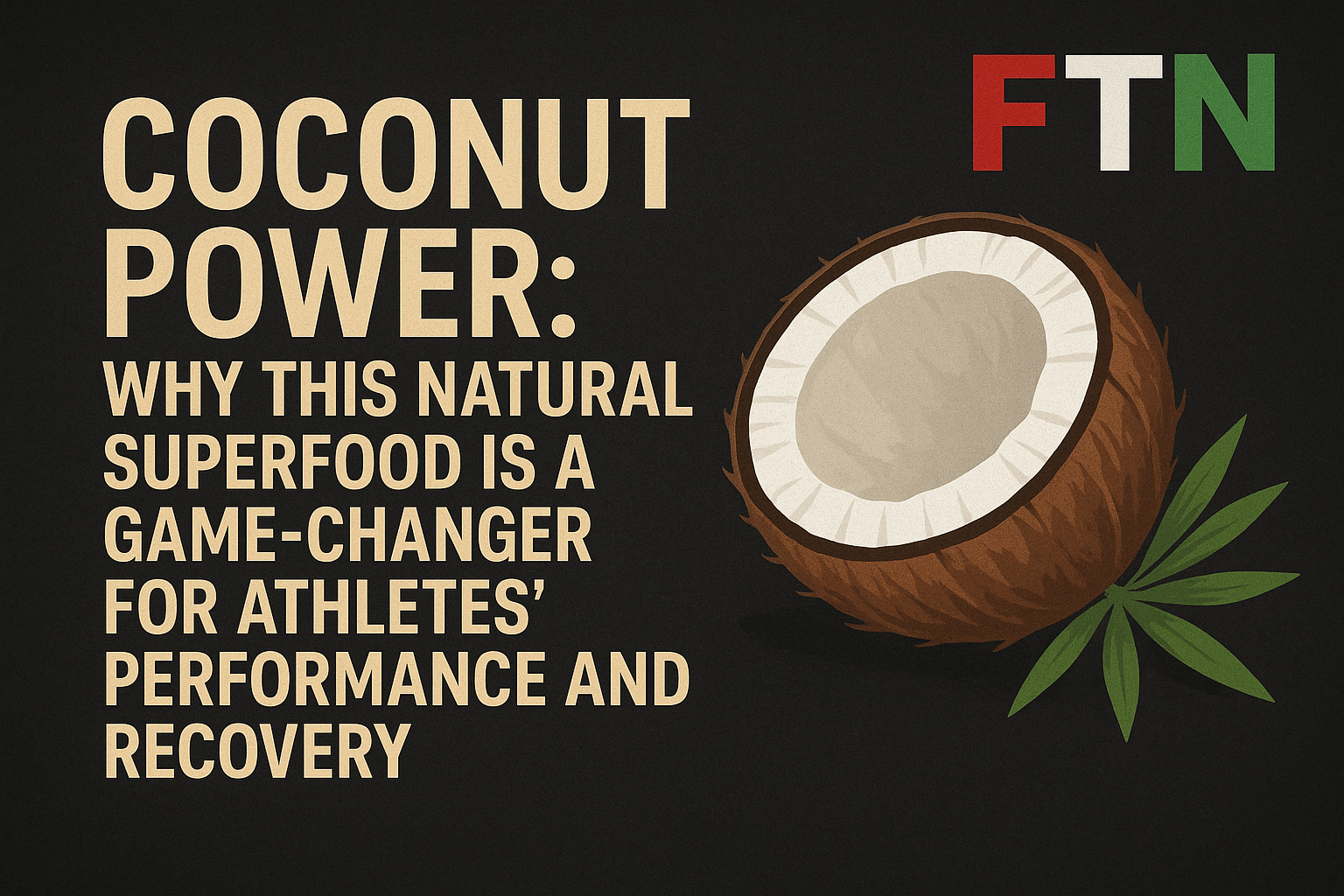Natural, clean, and packed with science-backed nutrients, coconut in its different forms offers unique advantages tailored for athletes — whether you’re a long-distance runner, strength trainer, or weekend warrior. Here’s a detailed look at how coconut water, meat, and oil can elevate your training, recovery, and overall wellness.
1. Hydration and Electrolyte Balance
Staying hydrated is essential when you train hard or perform in hot climates. Coconut water, the clear liquid inside young coconuts, is naturally isotonic — meaning it closely matches the electrolyte balance of your blood PMC+2Klarity Health Library+2Verywell Health+2Verywell Health+3Glamour+3Wikipedia+3.
It contains high levels of potassium, sodium, magnesium, and calcium — key minerals lost through sweat during exercise adecoco.u. For example, its potassium content rivals or even exceeds a banana per serving.
Studies show coconut water rehydrates as effectively as most sports drinks and plain water, with the advantage of fewer artificial ingredients and less stomach discomfort . The naturally occurring electrolytes and low-calorie content make it a smart post-workout choice.
2. Muscle Recovery and Anti‑Inflammation
After an intense workout, muscles crave nutrients to recover and grow. Coconut water delivers natural sugars and essential amino acids that aid muscle repair and reduce sorenessjissn.biomedcentral.com+15adecoco.us+15Klarity Health Library+15.
Moreover, coconut oil — especially virgin coconut oil rich in medium-chain triglycerides (MCTs) — offers potent anti-inflammatory and antioxidant effectsoilcocos.comreddit.com. These help reduce swelling, fight oxidative stress, and support efficient recovery between sessions.
Cytokinin, vitamin C, selenium, and other phytonutrients found in coconut enhance antioxidant defenses in the body, further alleviating post-exercise inflammation and supporting faster reboundreddit.comKlarity Health Library.
3. Clean, Fast Energy from MCTs
Unlike long-chain fatty acids, MCTs (medium-chain triglycerides) found in coconut are rapidly absorbed by the body and converted into ketones — alternative fuel used by both muscles and brain when glucose is lowoilcocos.comreddit.com.
This provides quick, clean energy without the heaviness or sugar crash associated with high-carb intake. It’s ideal before endurance training or during long exercise sessions requiring sustained performance.
Additionally, research suggests MCTs may support fat oxidation and lean-body maintenance — attractive benefits for athletes aiming to stay fit and leanoilcocos.com.
4. Immune Support for Consistent Training
Intense training can sometimes suppress immunity. Components in coconut — like lauric acid (found in coconut oil) and antioxidants — offer antimicrobial and immune-boosting benefits reddit.comKlarity Health Library.
Vitamin B-complex, vitamin C, manganese, and iron present in coconut flesh or meat further support immune function and cell repair to keep athletes healthy and consistent.
5. Nutrient Density and Digestive Health
From meat to milk, coconut brings more than hydration. Its flesh is rich in fiber, B‑vitamins, vitamin E, and minerals like magnesium, copper, iron, and zinc — all vital for energy metabolism, muscle function, and gut health reddit.comreddit.comKlarity Health Library.
Incorporating shredded coconut into oatmeal, yogurt bowls, or smoothies boosts digestive comfort and supplies sustained energy and essential micronutrients.
6. Scientific Insights: Coconut Water vs. Sports Drinks
Several controlled trials compared coconut water directly with commercial sports drinks during prolonged training sessions.
One crossover study with cyclists found no significant differences in performance, heart rate, lactate levels, or perceived exertion between coconut water and sports drinks during 90 minutes of cycling and a time trial — though coconut water delivered significantly more potassium starhealth.in+8pubmed.ncbi.nlm.nih.gov+8PMC+8.
Another randomized trial with treadmill-based athletes showed coconut water provided hydration and glycogen replenishment comparable to commercial sports beverages and water alone, with no negative exercise outcomes PMC.
The take‑home: for most moderate‑intensity sessions up to ~90 minutes, coconut water performs similarly to sports drinks — minus the added sugars and artificial additives — though its lower sodium content may limit effectiveness in extremely long or sweat-heavy workouts self.com.
7. Safe Inclusion and Practical Tips
How to include coconut for athletic benefit:
Pre- or post-workout drink: 250–500 ml of pure coconut water (no added sugar) helps rehydrate, restore electrolytes, and provide a mild energy boost.
Snack enhancement: Add coconut oil (1 tbsp) to smoothies or oatmeal to boost MCT intake.
As natural fuel: Consume shredded coconut with protein-rich foods (e.g. yogurt, nuts) to aid recovery.
Important cautions:
Coconut water is higher in potassium than most sports drinks—individuals with kidney conditions or those on restricted potassium diets should consult a healthcare provider first.
For workouts exceeding 90–120 minutes, or heavy sweating (e.g. marathons, triathlons), ensure additional sodium intake to avoid hyponatremiaself.com.
Limit consumption if you have IBS or digestive sensitivities, as some coconut carbs may trigger symptoms .
8. Real-World Athlete Use Cases
Endurance runners & cyclists often carry coconut water during training in tropical or hot climates to maintain electrolyte levels naturally.
Strength athletes or CrossFitters blend coconut oil into smoothies to fuel heavy lifts while managing blood sugar peaks.
Recovery-focused practitioners combine shredded coconut with plant-based proteins for post-exercise meals that aid inflammation control and muscle repair.
Traveling or outdoors athletes use coconut water as a clean hydration solution when sports drinks are unavailable or contain unfamiliar ingredients.
9. Limitations and Balanced Approach
While coconut shows many athletic benefits, keep expectations realistic:
It’s an excellent support to hydration and recovery — not a sole solution. Pair it with whole-food nutrition, balanced macronutrients, and sufficient protein intake.
Its lower sodium compared to many sports drinks may mean it’s not the best single choice for ultra-endurance events without additional salt or fuel supplementation.
10. Summary Table
| Form of Coconut | Key Benefits for Athletes |
|---|---|
| Coconut Water | Rapid rehydration, natural electrolytes, gentle on digestion |
| Coconut Oil (MCTs) | Fast energy, reduced inflammation, supports fat oxidation and recovery |
| Coconut Meat/Flesh | Fiber, mineral-rich, aids digestion, immune and nutritional support |
Final Thoughts
Coconut is more than a tropical trend — it’s a functional, natural, and accessible superfood that supports athletic hydration, energy, recovery, and immune resilience. Whether you’re finishing a tough workout, heading out on a long run, or simply optimizing your daily nutrition, incorporating coconut water, oil, and meat can give your training a natural edge.
For best results, use pure, unsweetened coconut products, and adjust intake to your training intensity and individual tolerance. Combined with varied nutrition and smart training, coconut can help fuel performance — the clean way.
myPersonal Take on the Video
This NutritionFacts.org video offers a clear, evidence-centered comparison of coconut water, plain water, and sports drinks. It underscores that, in many typical exercise scenarios (especially under moderate conditions), coconut water performs similarly to sports drinks—and even plain water—in keeping you hydrated . It also thoughtfully points out practical considerations like stomach discomfort and context specificity (e.g. heat), which resonates with the nuances you explored

